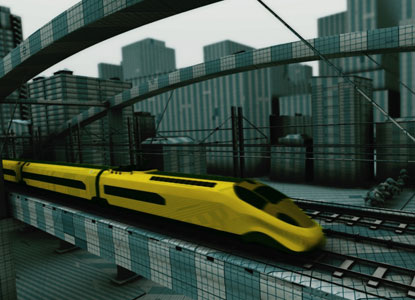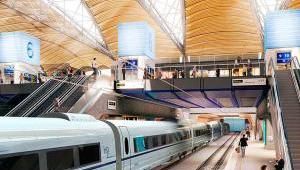By Richard Johnstone | 16 May 2013
The National Audit Office has today slammed the Department for Transport’s ‘unclear’ business case for the High Speed 2 rail line, warning that the scheme faces a £3.3bn funding gap.

In an examination of early planning for the project, auditors said they had ‘reservations’ about the proposal, which will be constructed in two stages. The first phase between London and Birmingham is due to open in 2026, at a cost of between £15.4bn and £17.3bn, while the full line to both Manchester and Leeds should be completed by 2032, costing around £32.7bn.
The NAO said the DfT had so far ‘poorly articulated the strategic need’ for the line, and failed to explain how High Speed 2 would boost regional economies. It is not clear, for example, how many of the 100,000 jobs it is hoped the line would support could be created without this investment.
The cost-benefit analysis, which predicts that every £1 spent on construction will lead to £1.40 of economic development in the first phase, had placed ‘a high emphasis’ on the impact of quicker journeys, the NAO said.
However, the relationship between faster trains and the strategic aims of the project, such as rebalancing the economy away from the Southeast, was unclear, according to High Speed 2: A review of early programme preparation.
This ratio also needed to be revised to reflect up-to-date projections for passenger numbers, auditors said. The DfT had revised down its estimate for the growth of train journeys as the economy expanded, but this was not yet part of the ‘underlying analysis’ for HS2.
The report also found a £3.3bn ‘funding gap’ in the plans for the first phase, based on the department’s forecast capital expenditure in the peak construction years of phase one, between 2017/18 and 2020/21.
Ministers have yet to decide how this would be closed and options are being considered as part of next month’s Spending Review.
Auditor general Amyas Morse said it was ‘too early in the High Speed 2 programme to conclude on the likelihood of its achieving value for money’.
He added: ‘The strategic case for the network should be better developed at this stage of the programme. It is intended to demonstrate the need for the line but so far presents limited evidence on forecast passenger demand and expected capacity shortages on existing lines. It is also unclear how High Speed 2 will transform regional economies by delivering jobs and growth.’
Transport Secretary Patrick McLoughlin said he did ‘not accept’ the NAO’s conclusions.
He said: ‘This is because it depends too much on out-of-date analysis and does not give due weight to the good progress that has been made since last year. This includes the appointment of an expert management team and the announcement of detailed plans for the line north of Birmingham.
‘The case for HS2 is clear. Without it the key rail routes connecting London, the Midlands and the North will be overwhelmed. HS2 will provide the capacity needed in a way that will generate hundreds of thousands of jobs and billions of pounds worth of economic benefits.’
McLoughlin said economic modelling of a cost-benefit ratio was ‘just the start of the story’.
He added: ‘We are not building HS2 simply because the computer says “yes”. We are building it because it is the right thing to do to make Britain a stronger and more prosperous place.’




















